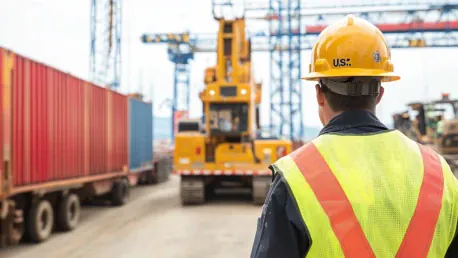The recent trade tensions between the United States and Canada have introduced a new layer of complexity for the Canadian construction sector, creating challenges that threaten to disrupt ongoing and future projects. The imposition of tariffs by both nations is set to have significant repercussions on costs, project timelines, and the strategic planning required for successful project completion. Understanding the specifics of these tariffs and their potential impact is crucial for industry participants to mitigate their effects.
Introduction of Tariffs and Their Basis
The imposition of tariffs stems from an executive order signed by President Donald Trump, which mandates a 25% tariff on Canadian goods and a 10% tariff on energy products. These tariffs are justified under the International Emergency Economic Powers Act (IEEPA), with the U.S. administration stating that they are necessary to address the fentanyl crisis, which they have linked to Canada. The tariffs are scheduled to take effect on February 4, 2025, unless Canada meets U.S. demands regarding the drug trade.
In retaliation, Canada has announced its own tariffs on $155 billion worth of U.S. goods. The first round of these tariffs, valued at $30 billion, will be implemented immediately. Additional tariffs, which will cover broader economic sectors such as vehicles, metals, produce, aerospace, meat, dairy, and recreational goods, will follow after a 21-day consultation period. These measures are intended to counterbalance the economic restrictions imposed by the U.S. and to protect Canadian interests in the trade dispute.
Impact on the Canadian Construction Industry
The Canadian construction industry, which is heavily dependent on its U.S. counterpart for materials, supplies, machinery, and expertise, is expected to face swift and severe repercussions as a result of these tariffs. The increased costs of importing goods and services from the U.S. will likely lead to higher project expenses and potential delays in timelines. This necessitates a careful review of existing contracts and thorough planning for future agreements to address the changes in costs and timelines due to the tariffs.
For many construction firms, the reliance on U.S. imports means that the tariffs will have a direct and immediate impact on their bottom line. Projects that are already underway will need to be re-evaluated to account for the additional costs, and future projects will require more detailed budgeting and financial planning to mitigate the increased expenses. Additionally, the potential delays in procuring necessary materials and equipment from the U.S. could lead to further challenges in meeting project deadlines.
Strategic Considerations for Contracting Parties
To effectively manage the risks and challenges posed by the tariffs, industry participants must take a proactive approach in reviewing and updating their contracts. Specific contractual provisions related to taxes and duties, or changes in law, need to be scrutinized to determine the allocation of risks and potential cost adjustments. Owners, contractors, and suppliers all have a role to play in ensuring that contracts reflect the new economic realities introduced by the tariffs.
Risk Allocation
Different contract models, such as fully cost-reimbursable, cost-plus, or fixed-price contracts, distribute financial risk in distinct ways. It is essential for parties to assess how these different models impact the allocation of financial risk due to increased tariffs. Understanding the risk allocation in existing contracts is crucial for managing the financial impact of the tariffs. For instance, in cost-plus contracts, the owner may have to absorb the additional costs, whereas in fixed-price contracts, the contractor may bear the risk.
Incoterms and Change of Law
Incoterms, or international commercial terms, play a vital role in determining which party is responsible for tariff-related costs. Parties must thoroughly understand how their existing contracts outline these responsibilities. Additionally, it is necessary to determine whether the tariffs qualify as a change in law under their contracts and to identify which party assumes the risk of such changes. These assessments will help ensure that all parties are prepared for the financial implications of the new tariffs.
Solvency Risk and Notice Periods
With increased costs due to tariffs, stakeholders must closely monitor the financial health of their partners to prevent potential insolvency issues that could affect project performance. Contracts often have specified notice periods for informing parties of changes in prices due to new tariffs. Adhering to these timelines is crucial for maintaining compliance and making credible claims. Ensuring that all parties are aware of pricing changes and their impact on the project will help mitigate the risk of unexpected financial disruptions.
Timing of Procurement and Validity of Quotes
Timely procurement of materials is essential to avoid the higher costs imposed by the new tariffs. For future projects, the potential restrictions on American contractors must be factored into procurement strategies. Existing quotes might no longer be valid due to the new tariffs. Contracting parties need to review and possibly update their pricing or hold off on new bids and cost assessments until a new pricing structure is determined. Strategic procurement planning can help minimize the financial impact and ensure the availability of necessary materials and equipment.
Proactive Steps for the Construction Sector
Much like the industry’s response at the beginning of the COVID-19 pandemic, the construction sector will have to conduct a thorough review and potentially overhaul contracts to adapt to the new market environment imposed by the tariffs. Proactive steps for industry participants include engaging legal counsel and strategic advisors, reviewing specific project risks, discussing mitigation strategies with project partners, and revising contract templates to reflect the new economic landscape.
Diversifying the Supply Chain
To mitigate the potential disruptions caused by tariffs, it is crucial to look for alternative sources of materials and supplies to diversify the supply chain. By doing so, construction firms can reduce their reliance on U.S. imports and protect themselves from future trade uncertainties. Being aware of the solvency risks related to partners and anticipating delays in sourcing U.S.-based advisors and labor will help firms navigate the challenges presented by tariffs and maintain project viability.
Engaging Legal and Strategic Advisors
Engaging legal and strategic advisors is critical for navigating the complexities introduced by the tariffs. Legal advisors can help construction firms review and update their contracts to reflect the new economic reality, ensuring that risk allocation and cost provisions are appropriately addressed. Strategic advisors can assist in developing contingency plans and exploring alternative suppliers and subcontractors to minimize the impact on project timelines and costs. Regular communication with advisors will be key to staying informed about the evolving trade landscape and making timely decisions to mitigate risks.









